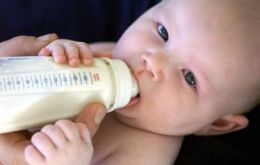MercoPress. South Atlantic News Agency
Health & Science
-
Friday, December 12th 2008 - 20:00 UTC
Fire scorches centuries old forests in Tierra del Fuego

A federal state of emergency has been declared in Argentina's extreme south Tierra del Fuego province, where more than 6.000 hectares of centuries-old forest have been scorched or are threatened by several fires, forcing the evacuation of dozens of people, according to an official release.
-
Monday, December 8th 2008 - 20:00 UTC
Total Irish pork-products recall because of dioxins

A total pork-product recall from Ireland has been implemented after slaughterhouse tests confirmed high levels of a cancer-causing toxin in meat. The substance has come from contaminated feed and is a big blow to Ireland's domestic and export pig industry.
-
Tuesday, December 2nd 2008 - 20:00 UTC
Melamine scandal virtually grounds China's dairy exports

China's dairy exports have all but ground to a halt following the scandal earlier this year when milk was tainted with the industrial chemical melamine. Data reported in the country's state media suggests that dairy exports fell 92% year-on-year in October.
-
Friday, November 28th 2008 - 20:00 UTC
Listeriosis outbreak in Chile: 91 cases, 5 deaths in 11 months

Chilean health authorities admitted this week for the first time that they have an outbreak of listeirosis which so far this year has caused five deaths out of 91 cases reported cases in metropolitan Santiago.
-
Wednesday, November 26th 2008 - 20:00 UTC
Greenhouse gas level reached all time high in 2007, says UN

Greenhouse gases, which drive global warming, continue to increase and carbon dioxide concentrations reached their highest level ever in 2007, according to a publication released Wednesday by the United Nations World Meteorological Organization, WNO.
-
Tuesday, November 25th 2008 - 20:00 UTC
Goat cheese sparks listeriosis scare in Santiago de Chile

A listeriosis scare broke out in Santiago del Chile when food sanitary officials ordered the withdrawal of a certain type and brand of cheese and the manufacturer sent a release to the different supermarket chains claiming that the decision was “only preventive”.
-
Monday, November 24th 2008 - 20:00 UTC
Calls for better UN coordination of ozone depletion efforts
United Nations should twin its efforts to combat ozone depletion and climate change to reap the greatest economic and environmental benefits, governments concluded at a recent global gathering.
-
Friday, November 21st 2008 - 20:00 UTC
China announces overhaul of dairy industry safety
China announced a complete overhaul of its dairy industry Thursday to improve safety at every step, from cow breeding to milk sales, admitting its worst food quality scandal in years had revealed “major problems” in quality control.
-
Thursday, November 20th 2008 - 20:00 UTC
Marches to protest building of dams in Chilean Patagonia

Several hundred demonstrators gathered outside of Endesa's Santiago headquarters Wednesday evening to protest the Spanish-Italian electricity company's plans to build a huge hydroelectric complex in Chilean Patagonia.
-
Sunday, November 16th 2008 - 20:00 UTC
Canada mad cow case blamed on feed manufacturer

The Canada Food Inspection Agency says a British Columbia feed manufacturer is the most likely source of the country's 13th case of mad cow disease.